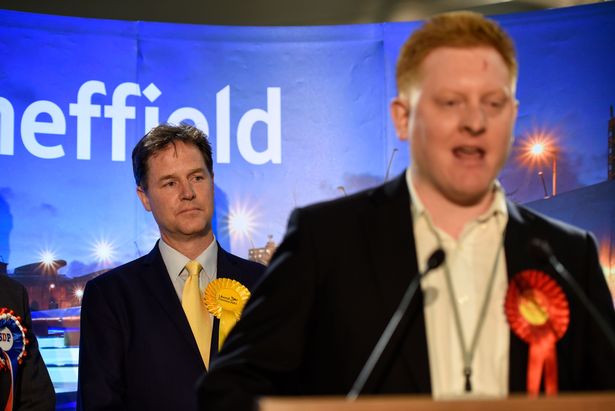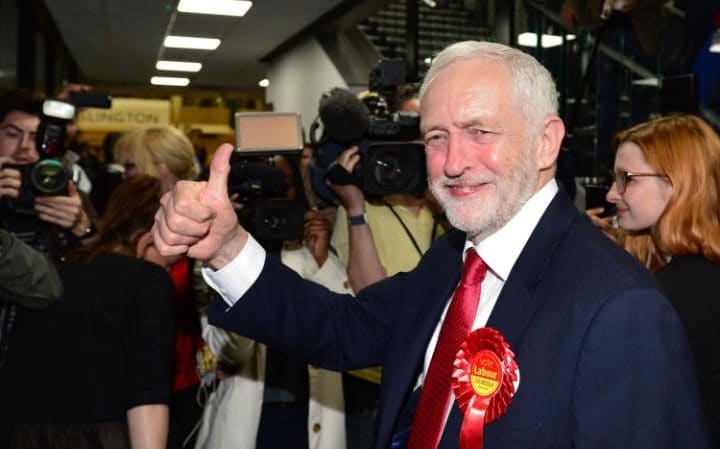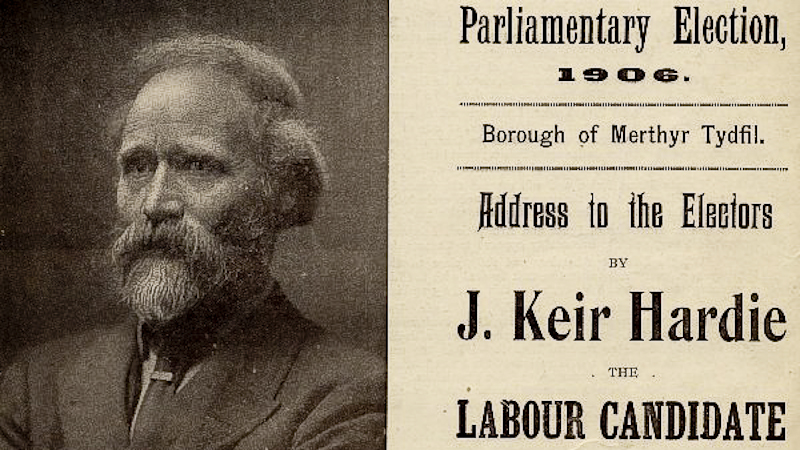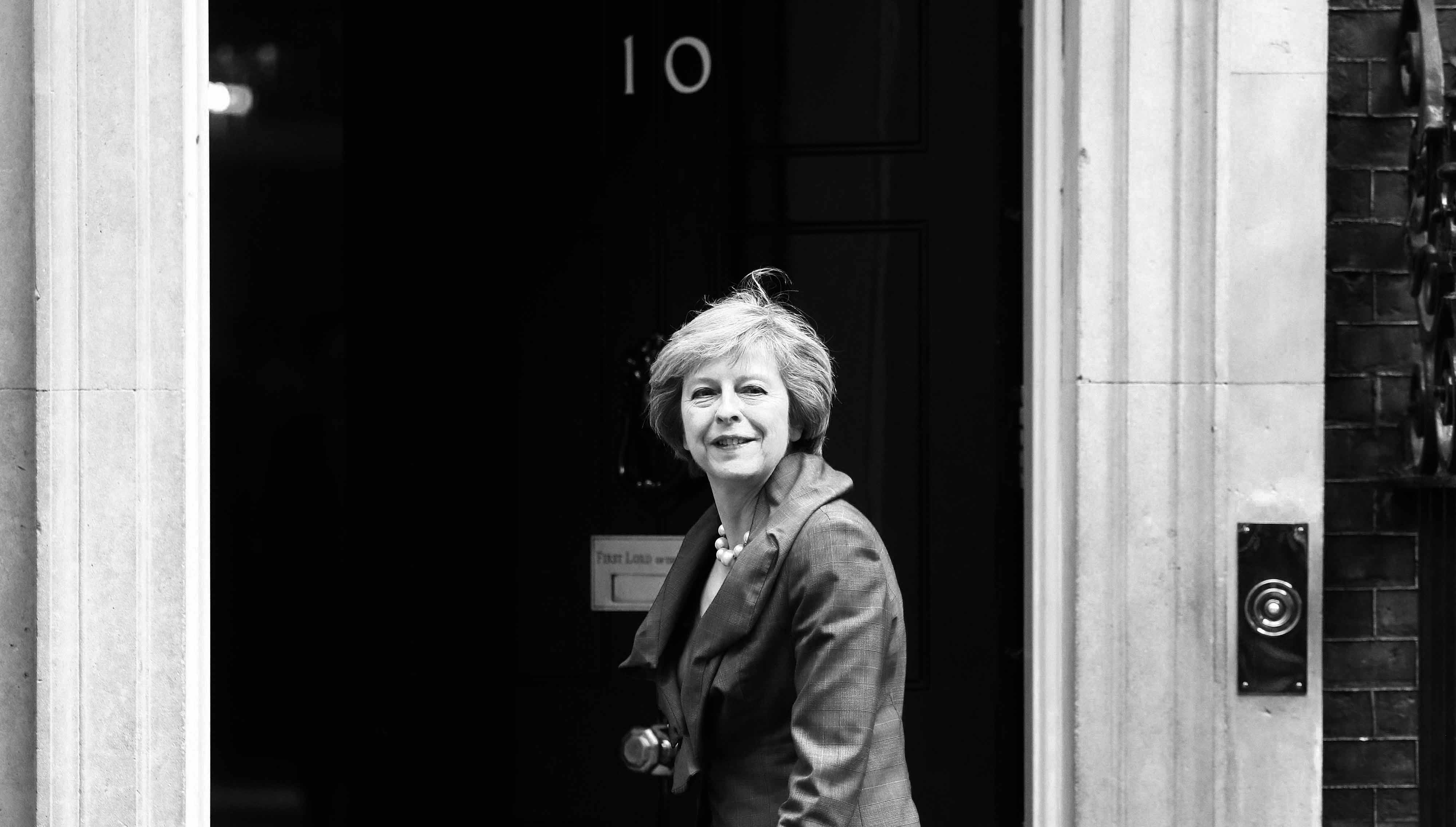That a Corbyn-led Labour Party would trail way behind in the polls was always eminently predictable. Nevertheless, says James Marshall of Labour Party Marxists, too many on the left are in a panic, are clutching at straws and are sadly deluding themselves about Labour’s manifesto
If the pollsters are to be believed, the Tories are set for a June 8 victory. A recent ORB/Telegraph poll of polls puts them on 47%, Labour 29%, the Liberal Democrats 9% and Ukip 5%. (The Daily Telegraph May 15 2017) Explaining such a huge Tory lead is easy.
In 2015 Labour members had the temerity to elect Jeremy Corbyn as leader, and our party is, as a consequence, riven by civil war and faces unremitting media lies, mockery and attack. Such a leader was never going to be acceptable for the establishment. Corbyn’s past statements on Marxism, the monarchy, Nato, nuclear weapons, the Soviet Union, Iraq, Zionism, Palestine, etc, rule him out as a trustworthy prime minister. No wonder, once he was elected Labour leader, there were stories of unnamed members of the army high command “not standing for” a Corbyn government and being prepared to take “direct action”. (The Sunday Times September 20 2015) Prior to that, the normally sober Financial Times ominously warned that Corbyn’s leadership damages Britain’s “public life”. (Financial Times August 14 2015)
Then, what a delicious irony, since the June 16 2016 referendum, Ukip support base has been undergoing a collapse. Having won the Brexit vote, it was bound to subsequently lose out. Half its 2015 voters are now saying that they will go over to the Tories. Theresa May’s hard Brexit stance and appeals to working class national chauvinism have proved very effective. Her calculation being that Tory remainers have nowhere else to go. The modest Lib Dem revival – which I had presumed almost as a given – is yet to happen. Therefore the expectation of a Tory government with perhaps a majority of up to 150.
Under these circumstances, the economistic left is dumbfounded. Over many, many years they have been advocating ‘bread and butter’ demands, such as ending austerity, renationalisation, trade union rights, a house-building programme, etc. Through such basic demands, we were repeatedly told, lies the secret of winning millions of extra voters and securing a leftwing Labour government.
Well, what do we find in Labour’s For the many, not the few manifesto? A promise to end “austerity”, “invest in cutting-edge” industries and to “upgrade our economy”, bring back into “public ownership” the rails, establish “publicly-owned water companies”, no new “private prisons”, “regain” control over “energy supply networks”, “review laws on trade union recognition”, “repeal the Trade Union Act”, “ban zero-hour contracts”, a programme to build a “million new homes”, etc.
Nevertheless, Labour remains languishing in the polls and looks set to lose dozens of seats in what could well be a Tory landslide. Hence the delusions, clutching at straws and panic.
Writing in the soft-left Labour Briefing, Graham Bash insists that the Tories face “a volatile post-Brexit crisis” and, given the “unprecedented influx of members” into the Labour Party, we have the “chance of a lifetime”. The journal’s editorial calls for “Labour to power” and somehow manages to claim that this amounts to “a clear socialist message”. (Labour Briefing May 2017)
The Labour Representation Committee, mother ship of Labour Briefing, welcomes the manifesto as a “a programme which would help begin the socialist transformation of Britain”. The LRC even gives For the many a subtitle: A socialist manifesto for Britain (although the word ‘socialism’ never appears in the actual text).
Socialist Worker welcomes Labour’s manifesto as a “shift to the left” and insists that it “points to an alternative for Labour that could help it beat the Tories”. Crazily, the SWP urges Corbyn to embrace the cause of Scottish independence. (Socialist Worker May 11 2017)
The Morning Star reassures it readers that the prime minister “has not chosen to call a general election because of political strength, but of weakness”. (Morning Star April 20 2017)
Peter Taaffe, general secretary of the Socialist Party in England and Wales has announced that his Trade Unionist and Socialist Coalition will not contest any seats on June 8. Instead it will be fighting “for a Jeremy Corbyn-led government with socialist policies”. Here SPEW is, of course, trailing behind the RMT union. (The Socialist May 12 2017)
Paul Mason, once a leading Workers Power member, now a right-moving “Momentum activist”, promises “campaign weekends”, a “call for Labour” app, “revolutionary peer-to-peer” software and training sessions. With his “people-powered movement” we can “elect the Labour Party on a socialist platform”.
Meanwhile, terrified by the prospect of another Tory government, Jon Cruddas, Clive Lewis, Helena Kennedy, Hilary Wainright, Tulip Siddiq, Owen Jones and Paul Mason have been urging Labour to stand aside for the Greens in Brighton Pavilion and the Isle of Wight. The idea is that the Greens would reciprocate. In line with this Compass – a “leftwing” pressure group, once aligned with the Labour Party, but now uniting “people across different political parties (and those with no party affiliation)” – has been promoting what it calls a ‘Progressive Alliance’. This popular front involves tactical voting, with Labour, the Lib Dems, Plaid Cymru, the Scottish National Party, Women’s Equality Party and the Greens getting together to “co-create a new politics”.
Socialist Resistance – otherwise known as Resisting Socialism – praises Corbyn for presenting a “radical alternative”. However, Compass’s “ambiguous concept” of a Progressive Alliance is rejected by SR, because it includes the Lib Dems. Instead there is the call for an “anti-austerity alliance” uniting Labour, the Greens and the SNP. Class politics is a long forgotten concept.
Reconciled
The hard right mirrors the soft left. Hence, we find TheDaily Telegraph describing the Labour manifesto as “a tax raid on the middle class” and a recipe to “take Britain back to the 1970s”. The Daily Mail adopts a similar stance. When the draft was first leaked, it was branded “a socialist programme that is red in tooth and claw and dripping with class envy”. The Sun, Express, The Times, etc could be quoted along similar lines. However, in fact, there is precious little that is “leftwing” about For the many. Certainly it has nothing whatsoever to do with socialism. Not even reformist socialism … which temptingly holds out the prospect of ending capitalism and introducing socialism through piecemeal legislative change. For the many accepts capitalism, does not mention socialism and seeks to reconcile antagonistic classes.
For orthodox Marxism, socialism – being the rule of the working class and the transition to a classless, stateless, moneyless society – begins with a fundamental rupture with capitalism.
In fact, for those who are willing to see, there are many tell-tale formulations in For the many designed to appease the pro-capitalist right. The opening section includes the revealing statement that Labour “will support businesses”. Big capital is assured that a Labour government will keep corporation tax “among the lowest of the major economies”. And there is the pledge to “put small business at the centre of our industrial strategy”. When it comes to the government’s deficit, we are told that Labour will set a “target” of “eliminating” it “within five years”. So ‘fiscal responsibility’. Almost an echo of former Tory chancellor George Osborne.
As for ‘back to the 1970s’ in truth it is more like back to the 1980s. Margret Thatcher thought that rail privatisation was a step too far. What of prisons? Did she ever seriously consider privatisation? Indeed it is worth noting that For the many internalises many aspects of Thatcherism. Take the programme of building a million homes. Nine-tenths of them are projected to be private. Only one-tenth council and housing association. A Corbynite take on the Tory ideal of the ‘property-owning democracy’: a cynical attempt to undermine working class consciousness by getting mortgage slaves to imagine themselves little capitalists.
Nato membership goes unquestioned and there is the boast that the last Labour government “consistently” spent above the 2% benchmark. Indeed it is claimed that the Tories are putting “Britain’s security at risk” by “shrinking the army to its smallest size since the Napoleonic wars”. We are also told that the “scrapping of Nimrod, HMS Ark Royal and the Harrier jump-jets have weakened our defences and cost British taxpayers millions”. Naturally, For the many commits Labour to renewing the Trident missile system: however, bizarrely, this will be done in the name of fulfilling Britain’s “obligations” under the Nuclear Non-Proliferation Treaty. So building the next generation of four SSBN submarines, together capable of incinerating 40 cities, is meant to be a step towards “a nuclear-free world”.
No genuine leftwinger, no genuine socialist, no genuine Marxist could possibly support For the many. Our motto remains ‘For this system, not one man, not one penny’ (Wilhelm Liebknecht speaking in the German Reichstag in 1871). The working class should, as a matter of elementary principle, oppose the standing army, not regret its reduced size. We are for a popular militia, not weapons of mass destruction. Nor are socialists admirers of Britain’s “long established democracy”. Britain’s quasi-democracy is recently established. Every democratic advance has been won from below in the face of fierce opposition from above. Some male workers got the vote in 1867 – there were property qualifications. In 1918 those restriction were finally removed. Some women too got the vote. But universal suffrage only came about in 1928 with the representation of the people act. And, of course, the capitalist press, the media, the education system normally ensures that the majority vote for safe, bribable, candidates. The country remains a monarchy, where the privy council, the secret service, the bureaucracy, the army high command and the judges can legally depose an unacceptable government. Yet For the many innocently proclaims that “Democracy is founded upon the rule of law and judicial independence.” A classic liberal formulation. And, apart from calling for an elected second chamber, a “more federalised country” and a vague phrase about “inviting recommendations about extending democracy”, the existing constitutional order is fully accepted.
The same goes for capitalism. For the many wants people to believe that capitalism, the economic system, can be managed so as to benefit “the many, not the few”. But it simply cannot be done. Capitalism – not that it is named – is a system of exploitation based on the endless self-expansion of capital and generalised wage-slavery. Individual capitalists and top managers can have their dividends heavily taxed and their salaries capped. But capital has to expand through extracting surplus value from workers … without that capital would cease to be capital, stay as money, find its way abroad, etc. In fact, the “creation of wealth” is not, as For the many maintains, “a collective endeavour between workers, entrepreneurs, investors and government”. Wealth is created not by so-called entrepreneurs, not by investors, not by government. No, wealth is created by workers … and nature.
Labour leaders typically promise fairness, justice and equality when they are in opposition, but, once in office, they always side with the interests of capital … typically disguised with the coded phrase, used by For the many, of putting the “national interest first”. And in the “national interest” they keep down wage rises, attack irresponsible strikes and seek to involve trade union officials in schemes to increase competitiveness.
Therefore the real significance of For the many lies not in how leftwing it is. No, it encapsulates the complete surrender of Jeremy Corbyn and John McDonnell. Because they put the “national interest first” they have reconciled themselves to both the existing constitutional order and the existing system of capitalist exploitation. Obviously the same applies to the main writers of For the many – purportedly Andrew Fisher, a former darling of the LRC, and Seumas Milne, a former Straight Leftist.
Programme
Clearly, today’s left has completely lost sight of the classic Marxist perspective of the workers’ party not taking power till it is in a position to realistically carry out its full minimum programme.
The minimum programme, it should be stressed, is not concerned with tinkering with capitalism, but rather readying the working class to become the ruling class. So the minimum programme is both the maximum the working class can achieve under capitalism and the minimum terms the workers’ party sets for forming a government.
Hence demands such as genuine equality for women, extending popular control over all aspects of society, radically devolving power downwards, a federal republic, Irish unity, abolishing the monarchy, the second chamber and MI5, and disestablishing the Church of England. Judges should be not be appointed from above, but subject to popular election. The shortage of housing should be ended through a massive programme of council house building. Flats and houses must be of a high quality and rents set at a token level. Allocation should be on the basis of need. State secrets should be ended along with all forms of censorship. The pharmaceutical industry, the power, water and transport infrastructure, land, the banks and financial services must be nationalised.
Marxists certainly oppose Brexit, instead we demand the democratisation of the European Union and going towards an indivisible Europe. And, while Marxists would advocate specific measures to protect small businesses and farms from exploitation by banks and monopolies, we have no wish to preserve this sector in perpetuity. Indeed its destruction is historically progressive.
For the sake of human survival we must put a stop to the degradation of nature. Native animal and plant species should be reintroduced. In short, the relationship between town and country must be put on a new footing. Huge farms and urban sprawl must be replaced by an urbanised countryside and cities full of gardens, local farms and open spaces.
Trade unions must be freed from state control. They are voluntary associations. When it comes to the armed forces, we demand that officers be elected, there should also be full trade union rights and rank-and-file soldiers must be encouraged to mutiny if they are given orders that run counter to the interests of democracy, the working class and the struggle for socialism. Of course, we want to see the end of the standing army and its replacement by a popular militia.
Unless we can carry out such a programme in full – which would, obviously, require international coordination – we cannot countenance forming a government. Meantime our task is to act as a party of extreme opposition. Hence our perspective of transforming the Labour Party.
Ten-point platform
There has been much silly media talk of a PLP split if Labour does badly on June 8. Reportedly 100 MPs are “plotting to form their own breakaway group to force Jeremy Corbyn to resign”. (The Daily Telegraph May 10 2017) Dan Jarvis, Yvette Cooper and Sir Keir Starmer have been mentioned. Their so-called plan would see MPs resigning the Labour whip and sitting as independents until Corbyn goes as leader. They would then condescend to rejoin the Parliamentary Labour Party.
Frankly, it is unlikely to happen. If they resign the whip they put themselves outside the Labour Party and invite instant expulsion. One or two diehards – maybe John Woodcock and Neil Coyle – might go, but do not expect anyone much to follow them.
Let us engage in a mental exercise. Imagine a split. Most traditional Labour voters would be expected to remain loyal, not opt for some “new political party”. Premising a major schism, a YouGov poll gave a Corbyn-led Labour Party 21% of the total vote and a “Labour right party” just 13%. Doubtless, such crushing statistics explain why Ed Balls, former shadow chancellor and Yvette Cooper’s husband, has dismissed the idea of a breakaway as “crazy”. (The Daily Telegraph September 1 2016)
Moreover, to this day, the right remains haunted by the ghosts of Ramsay MacDonald and the Gang of Four. MacDonald, twice a Labour prime minister, led what he called the National Labour Organisation into a thoroughly unequal coalition with the Tories in 1931. The Gang of Four of Roy Jenkins, David Owen, Bill Rodgers, Shirley Williams broke away exactly 50 years later to form the Social Democratic Party. The NLO instantly became a Tory slave. It finally dissolved in 1945. As for the SDP, it merged with the Liberal Party in 1988 and shared the same richly deserved fate. From the early 1970s, even till the late 80s, of course, the political centre enjoyed something of a revival. (From a 1951 2.5% historic low point, the Liberal Party underwent a revival in the 1970s, which saw them win 19.3% of the popular vote in the February 1974 general election. Despite the Jeremy Thorpe scandal even in the 1979, 1983 and 1987 general elections, the Liberal vote stood up at well over 10%. See – https://en.wikipedia.org/wiki/Liberal_Party_(UK)#Electoral_performance) No longer. Despite May’s hard Brexit stance providing an open goal, the Lib Dems remain, to this day marginalised and widely despised.
Given the punishing logic of the first-past-the-post system, we should therefore not expect Tom Watson to play Ramsay MacDonald, Sadiq Khan to step in for Philip Snowden or Iain McNicol make an appearance as Benjamin Musgrave. Conceivably, yes, Yvette Cooper or Chuka Umunna will put themselves forward against Corbyn after June 8. That is widely rumoured. Then everything will depend on Labour’s rank-and-file members, supporters and affiliates. It is worth noting therefore that some 2,500 joined the day May announced the general election.
Of course, a bad defeat will inevitably cause demoralisation and disorientation. The delusions of the soft left can only add to this. Nevertheless Corbyn has won two leadership elections and can win a third … if the blame for defeat is placed where it belongs: on the right. They began a protracted civil war, with the full backing and active connivance of the media, beginning in the summer of 2015: ie, when Corbyn looked like he was going to get elected as leader. Obviously we have every reason to defend Corbyn against the right and urge him to stand firm. However, we must go beyond that. That is why LPM advocates this ten-point platform.
- Fight for rule changes. All elected Labour representatives must be subject to one-member, one-vote mandatory reselection. MPs must be brought under democratic control – from above, by the NEC; from below by the CLPs.
Mandatory reselection, of course, terrifies the right. It was this, “even more than nuclear disarmament and membership of the European Community, that became the main catalyst for the launch of the breakaway Social Democratic Party”. (http://thirdavenue.org.uk/a-beginners-guide-to-the-labour-party-rulebook-part-2-reselection-of-mps) Progress, Lord David Sainsbury’s party within a party, furiously denounces mandatory reselection as “a weapon of fear and intimidation”. (www.progressonline.org.uk/2015/09/28/the-price-of-a-seat-in-parliament) Yes, mandatory reselection is viewed as an affront by every wrecker, every hireling, every parliamentary bighead.
It is worth looking at the background. Interestingly, and with good foundation, we read on the Progress website that mandatory reselection carries “echoes of the Paris Commune, and of the Russian soviets, where delegates were subject to recall if they displeased their local citizenry. It rests on the idea that leaders will always be tempted to sell you out, once they get power.” (www.progressonline.org.uk/2015/09/28/the-price-of-a-seat-in-parliament) Well, surely, that is what history actually shows.
For decades, sitting Labour MPs – certainly those with safe seats – enjoyed a job for life (or as long as no better offer came along). They might visit their constituency once or twice a year, deliver a speech to the AGM and write an occasional letter to the local newspaper. Meanwhile they lived a pampered, middle class life, frequented various London gentlemen’s clubs and spent their weekends in the home counties countryside with Lord this and Lady that. Despite such evident moral corruption, they were automatically the candidate for the next election. Unless found guilty of an act of gross indecency or had the party whip withdrawn, they could do as they pleased.
With the insurgent rise of Bennism that situation was increasingly called into question. The Campaign for Labour Party Democracy, founded in 1973, committed itself to a range of internal reforms – crucially mandatory reselection of MPs, finally agreed by the 1980 conference. What this saw, however, was not a Labour Party equivalent of the Paris Commune or the Russian soviets. There was no right to instant recall. Nevertheless, once in each parliament, our MPs had to get the endorsement of their local general management committee. Note, GMCs were made up of delegates elected by local party and trade union branches. They were sizable bodies, typically consisting of 80, 90, 100 or even more delegates.
At the prompting of the bourgeois media, Neil Kinnock, desperately seeking acceptability, sought to extract trade unions from the voting process altogether. He failed, but accepted a compromise. A local electoral college for the selection and reselection of candidates was introduced. Ordinary members were given a direct vote for the first time, leaving GMCs with the right to nominate and shortlist only. This electoral college system gave unions and affiliated organisations up to 40% of the vote, with ordinary members having some 60% (the actual balance was different in each seat, depending on party and union membership).
Trigger ballots were a product of the 1990s. Formally honouring conference’s “desire to maintain reselection”, they made it significantly “easier for MPs to defend their positions”. (http://thirdavenue.org.uk/a-beginners-guide-to-the-labour-party-rulebook-part-2-reselection-of-mps) Trigger ballots allowed for a sitting MP to be subject to a full-scale ballot of the membership. But only if they lost a trigger ballot.
- We need a sovereign conference once again. The cumbersome, undemocratic and oppressive structures, especially those put in place under the Blair supremacy, must be rolled back. The joint policy committee, the national policy forums, etc, must go.
- Scrap the hated compliance unit “and get back to the situation where people are automatically accepted for membership, unless there is a significant issue that comes up” (John McDonnell). (http://labourlist.org/2016/02/mcdonnell-and-woodcock-clash-over-plan-to-scrap-member-checks) The compliance unit operates in the murky shadows, it violates natural justice, it routinely leaks to the capitalist media.
- The stultifying inertia imposed on Momentum has proved to be an own goal. Jon Lansman has proved to be a competent autocrat. He blocked all Momentum attempts to oppose the ‘anti-Zionism equals anti-Semitism’ smears, he did done nothing to get Momentum to fight the 2016 purge of leftwing supporters of Corbyn. It is now impossible to transform it into a democratic organisation, or one that can educate, activate and empower the rank-and-file membership. So there is an urgent need for the left to organise with a view of establishing a worthwhile alternative.
- Securing new trade union affiliates ought to be a top priority. The FBU has reaffiliated. Excellent. Matt Wrack at last came to his senses and took the lead in reversing the disaffiliation policy. But what about the RMT? Let us win RMT militants to finally drop their support for the thoroughly misconceived Tusc project. Instead reaffiliate to the Labour Party. And what about the NUT? This year’s Cardiff conference saw the executive narrowly win an amendment, by 50.63% to 49.37%, which ruled out affiliation at this moment. This can be changed … if we campaign to win hearts and minds. Then there is PCS. Thankfully, Mark Serwotka, its leftwing general secretary, has at last come round to the idea. Yes, PCS affiliation will run up against the Trades Disputes and Trade Union Act (1927), introduced by a vengeful Tory government in the aftermath of the general strike. Civil service unions were barred from affiliating to the Labour Party and the TUC. The Civil and Public Services Association – predecessor of PCS – reaffiliated to the TUC in 1946. Now, however, surely, it is time for PCS to reaffiliate to the Labour Party. Force another change in the law.
- Every constituency, ward and other such basic unit must be won and rebuilt by the left. Our membership has grown from 200,000 in May 2015 to over 525,000 today. Surely during and after the election campaign we can get to a million. However, the left must convince the sea of new members, and returnees, to attend meetings … and break the stultifying grip of the right. Elect officers who support genuine socialism. Elect officers who are committed to transforming our wards and constituencies into vibrant centres of socialist organisation, education and action. As such, our basic units would be well placed to hold councillors and MPs to account.
- Our goal should be to transforming the Labour Party, so that, in the words of Keir Hardie, it can “organise the working class into a great, independent political power to fight for the coming of socialism”. Towards that end we need rule changes to once again permit left, communist and revolutionary parties to affiliate. As long as they do not stand against us in elections, this can only but strengthen us as a federal party. Today affiliated organisations include the Fabians, Christians on the left, the Cooperative Party … the Jewish Labour Movement and Labour Business. Allow the SWP, SPEW, CPGB, Left Unity, the Morning Star’s CPB, etc, to join our ranks.
- Being an MP ought to be an honour, not a career ladder, not a way for university graduates to secure a lucrative living. A particularly potent weapon here is the demand that all our elected representatives should take only the average wage of a skilled worker – a principle upheld by the Paris Commune and the Bolshevik revolution. Our MPs are on a basic £67,060 annual salary. On top of that they get around £12,000 in expenses and allowances, putting them on £79,060 (yet at present Labour MPs are only obliged to pay the £82 parliamentarians’ subscription rate). Moreover, as leader of the official opposition, Jeremy Corbyn not only gets his MPs salary: he is entitled to an additional £73,617. (https://en.wikipedia.org/wiki/Leader_of_the_Opposition_(United_Kingdom))
Let them keep the average skilled workers’ wage – say £40,000 (plus legitimate expenses). Then, however, they should hand the balance over to the party. Jeremy Corbyn, John McDonnell, Dianne Abbott ought to take the lead here.
- We must establish our own press, radio and TV. To state the obvious, tweeting and texting have severe limits. They are brilliant mediums for transmitting simple, short and sharp messages. But, when it comes to complex ideas, debating history and charting political strategies, they are worse than useless. Relying on the favours of the capitalist press, radio and TV is a game for fools. True, it worked splendidly for Tony Blair and Alistair Campbell. But, as Neil Kinnock, Gordon Brown and Ed Miliband found to their cost, to live by the mainstream media is to die by the mainstream media.
- Programmatically, we should adopt a new clause four. Not a return to the old, 1918, version, but a commitment to working class rule and a society which aims for a stateless, classless, moneyless society, which embodies the principle, ‘From each according to their abilities, to each according to their needs’. That is what socialism is all about. Not a measly £10 per hour “living wage”, shifting the tax balance and a state investment bank. No, re-establishing socialism in the mainstream of politics means committing the Labour Party to achieving a “democratic republic”. (Labour Party Marxists July 7 2016)
Sidelines
Organisations such as SPEW, the SWP, the CPBand Left Unity are having a hard time of things at the moment. Not only are they haemorrhaging members: there is profound political disorientation.
Having dismissed the Labour Party as nothing more than a British version of the US Democrat Party, having fought for trade unions to disaffiliate, SPEW’s general secretary, Peter Taaffe, is busily rowing backwards. But, if he wants his perfectly correct call for the Labour Party to be opened up once again to affiliation by socialist organisations to be treated seriously, it is obvious what he must do. Put an end to the farcical ‘Labour Party mark two’ Tusc project. Close it down … permanently.
However, comrade Taaffe is a towering genius, compared with Robert Griffiths, the CPB’s general secretary. When not promising to shop “entryists” to our witch-finder general, Iain McNicol, what he displays is a completely detached attitude towards Labour’s civil war. He says there are more important issues … like strikes and protest demonstrations. Morning Star editor Ben Chacko is even more small-minded. He sees “a task far bigger than the Labour Party”. Fighting for a mass revolutionary party? No. Forging the links necessary for establishing a new workers’ international? No. What comrade Chacko, laughably, wants is “organising at a local level in groups such as the People’s Assembly, Keep Our NHS Public, Black Activists Rising Against Cuts and many more”. (Morning Star September 10-11 2016)
Where we in LPM strive to elevate local struggles to the national and the international level, comrade Chacko’s sights are set on “saving an A&E or a youth club”. That he does so in the name of Marxist politics and creating a mass movement on the scale of the Chartists shows an inability to grasp even the A in the ABC of communism.
Having rejected any active involvement in the Labour Party at its 2016 conference, what remains of Left Unity is also reduced to issuing its own thoroughly unremarkable list: Another Europe, Stand Up to Racism, People’s Assembly demo, etc. No wonder its entire London membership now meets in the snug little space provided by Housmans Bookshop.
Then there is Charlie Kimber – showing the SWP’s crisis of leadership, he is now joint national secretary of the SWP and editor of Socialist Worker. Anyway, as might be expected, comrade Kimber calls for a Labour vote, but the more members who leave the SWP, the more he too stresses localism, ephemeral demonstrations, economic strikes and fake fronts. In his ‘Letter to a Jeremy Corbyn supporter’, comrade Kimber warns that “there’s a great danger that you could be drawn into endless internal battles”. The “crucial arena” of struggle is not “the long slog” of “endless meetings to (perhaps) get rid of a rightwinger”. No, according to comrade Kimber, the “best way” for Corbyn to win the general election is to “head up a much higher level of fightback in the workplaces and the streets”. (Socialist Worker September 20 2016)
Comrade Kimber’s claim that what really matters is not changing the Labour Party through the long, hard slog, but the “fightback in the workplaces and the streets”, is a Bakuninist, not a Marxist, formulation. For the 19th century anarchist leader, Mikhail Bakunin, strikes and protests were the key to revolution. By contrast, Marxists have always placed their emphasis on programme, consciousness and solid organisation.
In Marxist terms, therefore, because the Labour Party is historically established, because it is a class party, because it involves all big unions, because it has a mass electoral base, because it has drawn in hundreds of thousands of new members, what is now happening in Labour is a far higher form of the class struggle than mere economic strikes, ‘here today, gone tomorrow’ protests, let alone fake fronts. In point of fact, the civil war raging in the Labour Party is a highly concentrated form of the class struggle.







